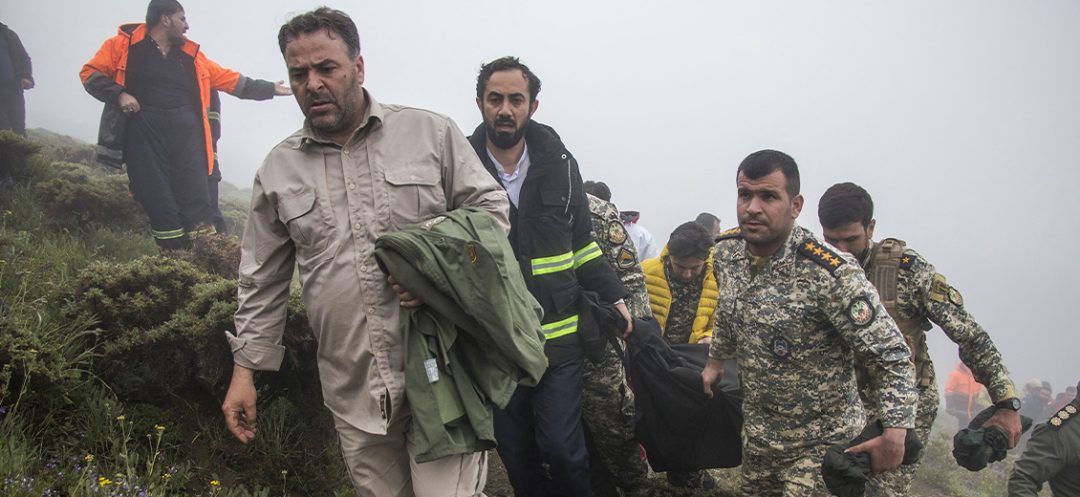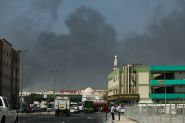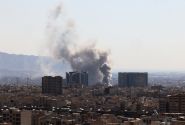- Home
- Middle East
- Iran Asked Washington for Help After Helicopter Crash

©(AZIN HAGHIGHI / MOJ News Agency / AFP)
The United States said on Monday that Iran had asked for its assistance after the helicopter crash that claimed the life of Iranian President Ebrahim Raisi, and offered its condolences while deeming that he had "blood on his hands".
"The Iranian government has asked us for help," State Department spokesman Matthew Miller told reporters, even though the US and Iran have not maintained diplomatic relations since the 1979 revolution.
"We said we would be prepared to help, which we would do for any government in this situation," the spokesman added.
"In the end, for essentially logistical reasons, we were unable to provide this assistance," he said, declining to give details of the content of the request or through which communication channel it was made.
He did, however, confirm that it was to help with the search after the helicopter disappeared on Sunday afternoon while flying over a steep, wooded region of Iran in difficult weather conditions, with rain and thick fog.
Iran's Foreign Minister, Hossein Amir-Abdollahian, also died in the crash, along with other officials.
The accident occurred at a time when the United States and Iran had reportedly recently held discreet talks in Oman following clashes between Iran and Israel.
The US offered its "official condolences" in a State Department statement.
"As Iran chooses a new president, we reaffirm our support for the Iranian people and their struggle for human rights and fundamental freedoms," the text added.
The late president "was a man with a lot of blood on his hands", "responsible for atrocious human rights violations" in Iran, commented White House spokesman John Kirby.
For all that, Washington sees no "broader impact on regional security".
"I don't necessarily see a broader impact on regional security," said US Defense Secretary Lloyd Austin, asked at a press conference.
"We're continuing to monitor the situation, but we have no idea what caused the crash," Mr. Austin went on to say, saying that the U.S. was "not involved" and that U.S. forces had not changed their posture after the crash.
Former Foreign Minister Mohammad Javad Zarif blamed the accident on persistent US sanctions that have hampered the sale of aviation parts.
Asked about Mr. Zarif's remark, the State Department spokesman replied, "Ultimately, it is the Iranian government that is responsible for the decision to fly a 45-year-old helicopter in what were described as poor weather conditions, and no one else."
With AFP
"The Iranian government has asked us for help," State Department spokesman Matthew Miller told reporters, even though the US and Iran have not maintained diplomatic relations since the 1979 revolution.
"We said we would be prepared to help, which we would do for any government in this situation," the spokesman added.
"In the end, for essentially logistical reasons, we were unable to provide this assistance," he said, declining to give details of the content of the request or through which communication channel it was made.
He did, however, confirm that it was to help with the search after the helicopter disappeared on Sunday afternoon while flying over a steep, wooded region of Iran in difficult weather conditions, with rain and thick fog.
Iran's Foreign Minister, Hossein Amir-Abdollahian, also died in the crash, along with other officials.
The accident occurred at a time when the United States and Iran had reportedly recently held discreet talks in Oman following clashes between Iran and Israel.
The US offered its "official condolences" in a State Department statement.
"As Iran chooses a new president, we reaffirm our support for the Iranian people and their struggle for human rights and fundamental freedoms," the text added.
The late president "was a man with a lot of blood on his hands", "responsible for atrocious human rights violations" in Iran, commented White House spokesman John Kirby.
Regional impact
For all that, Washington sees no "broader impact on regional security".
"I don't necessarily see a broader impact on regional security," said US Defense Secretary Lloyd Austin, asked at a press conference.
"We're continuing to monitor the situation, but we have no idea what caused the crash," Mr. Austin went on to say, saying that the U.S. was "not involved" and that U.S. forces had not changed their posture after the crash.
Former Foreign Minister Mohammad Javad Zarif blamed the accident on persistent US sanctions that have hampered the sale of aviation parts.
Asked about Mr. Zarif's remark, the State Department spokesman replied, "Ultimately, it is the Iranian government that is responsible for the decision to fly a 45-year-old helicopter in what were described as poor weather conditions, and no one else."
With AFP
Read more



Comments